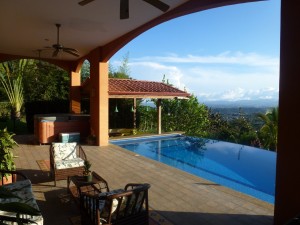Investment gurus will tell you it takes about 30 different stocks to fully diversify a portfolio.
But what does that mean?
Well, it means that the inherent risk in any one stock is completely wiped away when that stock is combined in a portfolio of 29 other stocks. That is, all you’re left with at that level of diversification is “market” risk, or the risk inherent in the overall market, as opposed to any individual stock.
Investment gurus will also tell you, however, that you should go a step further. You should also diversify in terms of types of stocks, such as large and small cap, domestic and foreign, and so on. They will also tell you to go a step further and diversify in terms of the types of investments. That you should include other investments in addition to stocks and bonds, such as real estate. And the principles of diversification with respect to real assets apply with equal measure. Meaning you should diversify in terms of types of real estate, residential and commercial, domestic and foreign, and so on.
The point is that it can make very good sense, in terms of eliminating risk, to consider foreign real estate as part of a fully diversified investment portfolio. And we believe that to diversify your portfolio with Costa Rica real estate is a wise decision. Here’s why…
There are many types of risk to be concerned about with any investment, such as country risk, political risk, monetary (or inflation) risk, etc., etc. Having all your eggs in one basket, even a basket as seemingly “risk free” as the U.S., can be a dangerous proposition. We all learned that in 2008!
Consider the political situation going on in the U.S. right now. It’s fraught with risk. Wouldn’t you agree?
And these days another type of risk has entered into the lexicon…climate change risk. It could indeed be possible one day soon to own, as the song says, “ocean front property in Arizona.” But all kidding aside, the penchant in the U.S. to develop as close to the high tide mark as possible could mean that many coastal investments will soon be “under water.”
So, how does Costa Rica stack up with regard to all these types of risk. Well, it’s certainly not insulated from them. Costa Rica has its own political and fiscal problems, that’s to be sure. The country is not immune from climate change risks, although perhaps less susceptible than the U.S. Costa Rica’s shores generally do not have the proverbial target painted on them each year when hurricane season comes around. In Costa Rica, building on the shoreline is usually not permitted. Most properties are located far enough and high enough away from the high tide mark to be insulated from rising ocean levels.
Costa Rica is a relatively stable and growing economy. The government has long placed a priority on social spending as opposed to military. In fact, Costa Rica doesn’t even have a military. Now, you might be thinking, well that certainly imposes a risk. Perhaps, but it’s doubtful any of Costa Rica’s neighbors would try anything too aggressive with Costa Rica being perhaps the strongest ally of the U.S. in Latin America.
Costa Rica is a shining example of democracy in a region where that form of government has had its detractors. Peaceful transitions of power are always the norm. Costa Rica’s laws are very friendly toward foreign investment. In fact, with only a couple very limited exceptions, foreigners can hold fee-simple title to real estate with all the rights of a Costa Rican citizen.
Costa Rica has grown into a world-wide tourism juggernaut. This has given rise to strong interest among the foreign investing community in Costa Rica real estate and for good reason. Costa Rica real estate is perhaps some of the most beautiful on planet earth. Costa Rica’s continued growth in tourism and in attracting foreign investment should lead to solid ongoing appreciation potential.
And one thing’s for sure, the effort to diversify your portfolio with Costa Rica real estate will certainly be an enjoyable experience.

